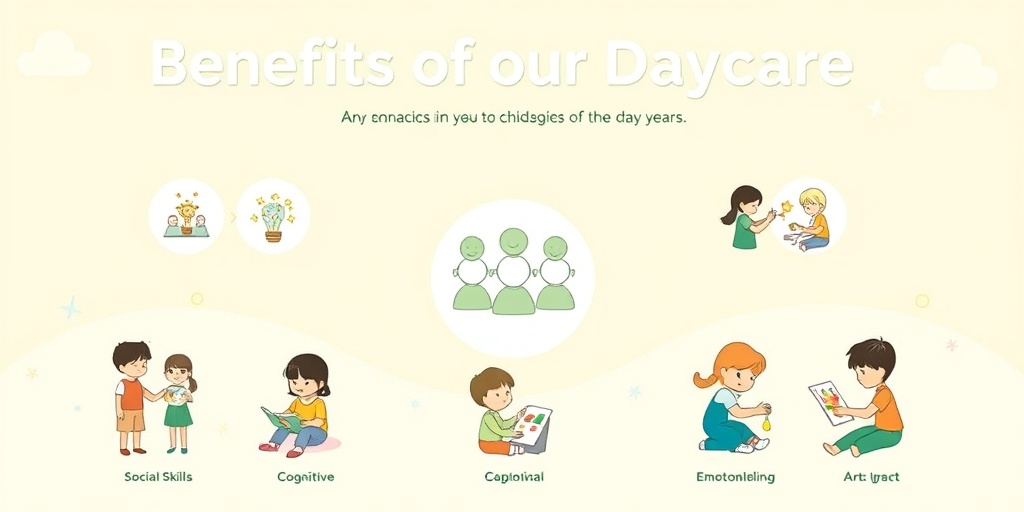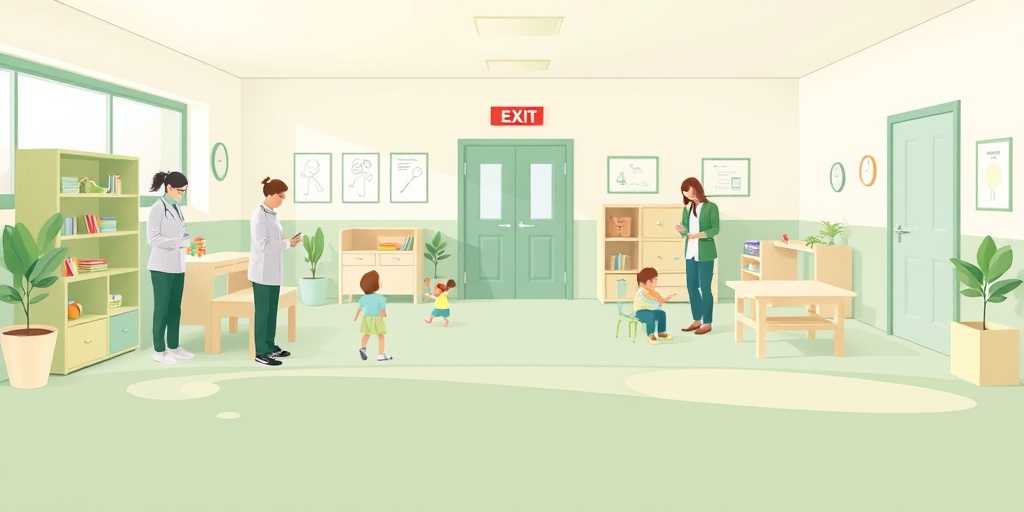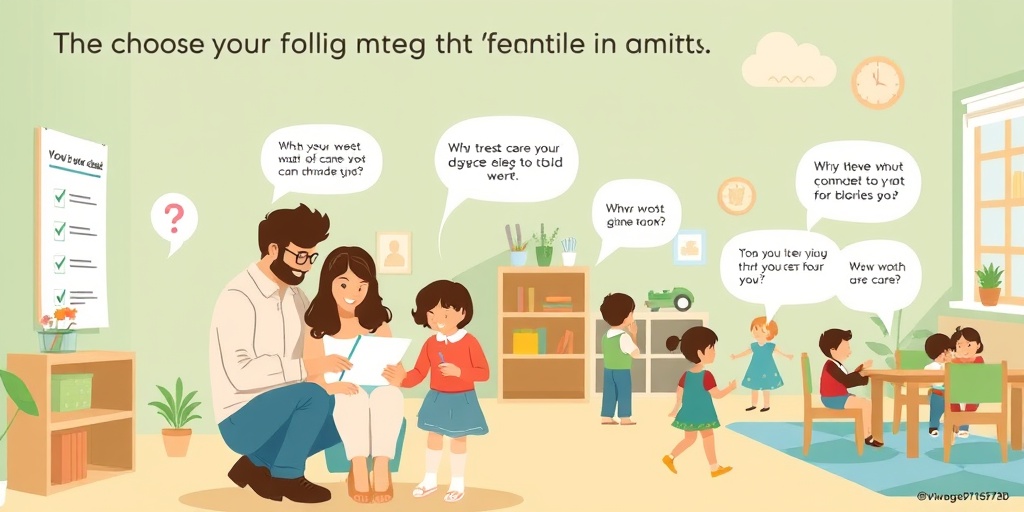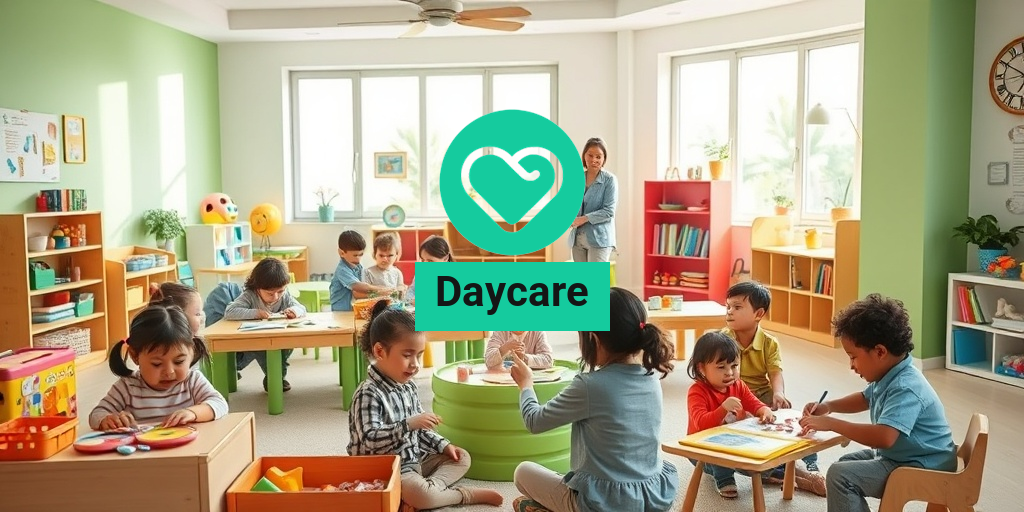What Is Daycare?
Daycare, often referred to as child care, is a service that provides supervision and care for children, typically while their parents are at work or otherwise occupied. This arrangement can take various forms, including daycare centers, home-based daycare, and family daycare. The primary goal of daycare is to ensure that children are safe, engaged, and nurtured in a structured environment.
Types of Daycare
Understanding the different types of daycare can help parents make informed decisions about their child’s care. Here are the most common types:
- Daycare Centers: These are larger facilities that cater to multiple children, often divided by age groups. They typically have trained staff and structured programs.
- Home-Based Daycare: Operated out of a caregiver’s home, this type of daycare usually has fewer children, allowing for a more intimate setting.
- Family Daycare: This is similar to home-based daycare but may involve a family member or friend providing care in their home.
Daycare Meaning and Importance
The term “daycare” encompasses a wide range of services aimed at supporting working parents. It plays a crucial role in early childhood development, providing children with opportunities for socialization, learning, and play. Daycare settings often incorporate educational activities that promote cognitive and emotional growth, making them an essential part of a child’s early years.
Daycare Benefits
Choosing the right daycare can have a profound impact on both children and parents. Here are some of the key benefits of enrolling your child in daycare:
1. Socialization Opportunities
One of the most significant advantages of daycare is the chance for children to interact with their peers. This socialization helps children develop essential skills such as sharing, cooperation, and conflict resolution. Engaging with other children can also enhance their communication skills and boost their confidence.
2. Structured Learning Environment
Daycare centers often provide structured programs that include educational activities tailored to different age groups. These programs can help children develop critical thinking skills, creativity, and a love for learning. Parents can rest assured knowing their child is engaged in activities that promote growth and development.
3. Professional Caregivers
Daycare facilities typically employ trained professionals who understand child development and safety protocols. This expertise ensures that children are cared for in a safe and nurturing environment. Parents can feel confident that their child is in good hands while they are away.
4. Flexibility for Parents
Daycare provides parents with the flexibility they need to balance work and family life. With reliable childcare, parents can focus on their jobs without the constant worry of their child’s well-being. This balance can lead to improved mental health and overall family dynamics.
5. Preparation for School
Enrolling a child in daycare can serve as an excellent stepping stone to formal education. Many daycare programs incorporate early literacy and numeracy skills, helping children transition smoothly into kindergarten and beyond. This early preparation can give children a head start in their academic journey.
6. Peace of Mind
Knowing that your child is in a safe and stimulating environment can significantly reduce parental stress. Daycare allows parents to focus on their responsibilities, knowing their child is being cared for by professionals who prioritize safety and development.
7. Community Support
Daycare centers often foster a sense of community among parents. This can lead to valuable support networks, where parents can share experiences, advice, and resources. Connecting with other families can enhance the overall daycare experience for both children and parents.
In conclusion, daycare is more than just a place for children to stay while their parents work; it is a vital component of early childhood development. With numerous benefits ranging from socialization to structured learning, daycare can significantly impact a child’s growth and well-being. If you’re considering daycare options, resources like Yesil Health AI can provide evidence-based answers to your questions, helping you make the best choice for your family. 🌟

Daycare Health Risks
Choosing a daycare for your child is a significant decision that many parents face. While daycare can provide essential socialization and learning opportunities, it’s crucial to be aware of potential health risks associated with these environments. Understanding these risks can help you make informed choices and ensure your child’s well-being.
Common Health Risks in Daycare Settings
Daycare centers can be breeding grounds for various illnesses, primarily due to the close contact among children. Here are some common health risks to consider:
- Infectious Diseases: Children in daycare are often exposed to colds, flu, and other contagious illnesses. The close quarters and shared toys can facilitate the spread of germs.
- Gastrointestinal Infections: Outbreaks of stomach viruses, such as norovirus, can occur in daycare settings, leading to vomiting and diarrhea.
- Allergies and Asthma Triggers: Daycare environments may expose children to allergens like dust mites, pet dander, and mold, which can trigger allergic reactions or asthma attacks.
- Inadequate Supervision: In some cases, insufficient staff-to-child ratios can lead to accidents or injuries, increasing the risk of physical harm.
Understanding the Impact of Daycare on Child Health
While the risks are present, it’s essential to weigh them against the benefits of daycare. Socialization, early education, and routine can significantly contribute to a child’s development. However, parents should remain vigilant and proactive in minimizing health risks.
Signs of Illness to Watch For
As a parent, being aware of the signs of illness can help you act quickly. Look out for:
- Fever: A temperature above 100.4°F (38°C) may indicate an infection.
- Persistent Cough: A cough that lasts more than a few days could signal a respiratory infection.
- Unusual Behavior: If your child is unusually lethargic or irritable, it may be a sign of illness.
- Gastrointestinal Symptoms: Watch for vomiting, diarrhea, or stomach pain.
Daycare Safety Tips
Ensuring your child’s safety in daycare is paramount. Here are some practical tips to help you choose a safe environment and keep your child protected:
Choosing the Right Daycare Center
When selecting a daycare, consider the following:
- Licensing and Accreditation: Ensure the daycare is licensed and meets state regulations. Accreditation from recognized organizations can also indicate quality.
- Staff Qualifications: Inquire about the staff’s training and experience. Well-trained caregivers are better equipped to handle emergencies and provide quality care.
- Child-to-Staff Ratio: A lower ratio means more individualized attention for your child, which can enhance safety and care.
- Facility Safety: Check for safety features such as secure entrances, childproofed areas, and clean, well-maintained facilities.
Daily Safety Practices
Once your child is enrolled, encourage the daycare to implement daily safety practices:
- Regular Health Checks: Daily health screenings can help identify sick children before they enter the daycare.
- Hygiene Protocols: Ensure that staff follows strict hygiene practices, including regular handwashing and sanitizing toys and surfaces.
- Emergency Procedures: Familiarize yourself with the daycare’s emergency protocols, including evacuation plans and first aid procedures.
Communicating with Caregivers
Open communication with daycare staff is vital for your child’s safety:
- Daily Updates: Request daily reports on your child’s activities, behavior, and any incidents that may have occurred.
- Health Concerns: Share any health concerns or allergies your child may have, ensuring caregivers are well-informed.
- Feedback Loop: Establish a feedback loop where you can discuss any issues or suggestions for improvement.
By being proactive and informed, you can help mitigate health risks and ensure a safe, nurturing environment for your child in daycare. Remember, your child’s health and safety are the top priorities! 🛡️👶

Daycare Hygiene Practices
Ensuring a clean and hygienic environment in daycare settings is crucial for the health and well-being of children. With young immune systems still developing, maintaining high standards of hygiene can help prevent the spread of illnesses and infections. Here, we’ll explore essential daycare hygiene practices that every facility should implement.
Regular Cleaning and Disinfection
One of the most effective ways to maintain hygiene in a daycare is through regular cleaning and disinfection. This includes:
- Daily Cleaning: Surfaces such as tables, toys, and play areas should be cleaned daily with appropriate cleaning agents.
- Weekly Deep Cleaning: A thorough cleaning of the entire facility should be conducted weekly, including carpets, curtains, and less frequently used areas.
- Disinfecting High-Touch Areas: Frequently touched surfaces like doorknobs, light switches, and bathroom fixtures should be disinfected multiple times a day.
Hand Hygiene Practices
Hand hygiene is one of the simplest yet most effective ways to prevent the spread of germs. Daycare staff and children should follow these practices:
- Frequent Handwashing: Encourage children to wash their hands with soap and water before meals, after using the restroom, and after playing outside.
- Use of Hand Sanitizers: When soap and water are not available, alcohol-based hand sanitizers can be used, especially for staff and older children.
- Modeling Behavior: Staff should model proper handwashing techniques to instill good habits in children.
Safe Food Handling
Food safety is a critical aspect of daycare hygiene. Here are some guidelines to follow:
- Proper Storage: Ensure that all food is stored at the correct temperatures to prevent spoilage.
- Clean Preparation Areas: Food preparation areas should be cleaned and sanitized before and after use.
- Allergy Awareness: Be aware of children’s allergies and ensure that food is prepared in a way that prevents cross-contamination.
Health Monitoring
Regular health monitoring can help identify potential health issues before they spread. This includes:
- Daily Health Checks: Staff should conduct daily health checks for symptoms of illness, such as fever or rash.
- Clear Illness Policies: Establish and communicate clear policies regarding when children should stay home due to illness.
- Emergency Procedures: Have procedures in place for handling health emergencies, including access to first aid supplies.
Daycare Nutrition Guidelines
Nutrition plays a vital role in the growth and development of children. Daycare facilities must provide balanced meals and snacks that meet the nutritional needs of young children. Here are some essential daycare nutrition guidelines to consider.
Balanced Meal Planning
Daycare meals should be well-balanced, incorporating a variety of food groups. Here’s how to achieve this:
- Fruits and Vegetables: Aim to include a serving of fruits and vegetables in every meal. Fresh, frozen, or canned options can all be nutritious choices.
- Whole Grains: Use whole grain bread, pasta, and cereals to provide essential fiber and nutrients.
- Protein Sources: Include lean meats, poultry, fish, beans, and legumes to support growth and development.
Portion Control
Understanding appropriate portion sizes is crucial for young children. Here are some tips:
- Age-Appropriate Portions: Serve smaller portions for younger children and allow them to ask for more if they are still hungry.
- Encourage Self-Serving: Allow children to serve themselves from a selection of healthy options, promoting independence and self-regulation.
Hydration
Staying hydrated is essential for children’s health. Daycare facilities should:
- Provide Water Access: Ensure that fresh water is available at all times, encouraging children to drink throughout the day.
- Limit Sugary Drinks: Minimize the availability of sugary beverages like soda and fruit juices, opting instead for water or milk.
Allergy Management
Managing food allergies is critical in daycare settings. Here’s how to handle it:
- Identify Allergies: Collect information from parents about any food allergies and dietary restrictions.
- Labeling Foods: Clearly label all food items and ensure that allergenic foods are kept separate from safe options.
- Emergency Plans: Have an emergency plan in place for allergic reactions, including access to epinephrine auto-injectors if necessary.
By implementing these daycare hygiene practices and nutrition guidelines, daycare centers can create a safe and healthy environment that supports the well-being and development of children. 🌟

Daycare Emergency Procedures
When it comes to the safety and well-being of children, having a solid plan in place for emergencies is crucial. Daycare centers must be prepared for various situations, from natural disasters to medical emergencies. Understanding these procedures can give parents peace of mind and ensure that children are safe and secure. Here’s a closer look at essential daycare emergency procedures.
Types of Emergencies
Daycare facilities should be equipped to handle a variety of emergencies, including:
- Medical Emergencies: This includes situations like allergic reactions, injuries, or sudden illnesses.
- Fire Emergencies: Procedures must be in place for evacuating children safely in case of a fire.
- Natural Disasters: Earthquakes, floods, or severe weather conditions require specific protocols.
- Intruder Situations: Daycare centers should have plans for lockdowns or safe rooms in case of an intruder.
Emergency Preparedness Plans
Every daycare should have a comprehensive emergency preparedness plan that includes:
- Regular Drills: Conducting fire drills and lockdown drills regularly helps children and staff know what to do in an emergency.
- First Aid Training: All daycare workers should be trained in first aid and CPR to respond effectively to medical emergencies.
- Communication Plans: Establishing a clear communication plan ensures that parents are informed promptly during an emergency.
- Emergency Kits: Daycare centers should maintain well-stocked emergency kits that include first aid supplies, water, and non-perishable snacks.
Parental Involvement
Parents play a vital role in the emergency preparedness of their child’s daycare. Here are some ways to get involved:
- Stay Informed: Ask about the daycare’s emergency procedures and ensure you understand them.
- Participate in Drills: If possible, participate in emergency drills to familiarize yourself and your child with the process.
- Provide Updated Information: Keep the daycare informed of any changes in your child’s medical history or emergency contacts.
Choosing the Right Daycare
Finding the right daycare for your child can be a daunting task. With so many options available, it’s essential to consider various factors to ensure you make the best choice. Here’s a guide to help you navigate the process of selecting the perfect daycare.
Assessing Your Needs
Before you start looking for a daycare, take some time to assess your family’s needs:
- Location: Consider how far you’re willing to travel. A daycare center near me can save time and reduce stress.
- Hours of Operation: Ensure the daycare’s hours align with your work schedule.
- Age Appropriateness: Different centers cater to various age groups, so find one that fits your child’s age.
Researching Options
Once you’ve identified your needs, it’s time to research potential daycare centers:
- Online Reviews: Check online reviews and ratings to gauge the experiences of other parents.
- Visit Multiple Centers: Schedule visits to several daycare centers to get a feel for the environment and staff.
- Ask Questions: Don’t hesitate to ask about staff qualifications, child-to-staff ratios, and daily activities.
Trust Your Instincts
After visiting potential daycare centers, trust your instincts. Here are some signs that a daycare is a good fit:
- Welcoming Atmosphere: The environment should feel warm and inviting for both you and your child.
- Engaged Staff: Observe how staff interact with children. They should be attentive, caring, and responsive.
- Cleanliness and Safety: The facility should be clean, safe, and well-maintained.
Choosing the right daycare is a significant decision that impacts your child’s early development. By considering your needs, researching options, and trusting your instincts, you can find a daycare that provides a nurturing and safe environment for your little one. 🌟

Frequently Asked Questions about Daycare
What is daycare?
Daycare refers to a service that provides care and supervision for children during the day, typically while their parents are at work. It can include various programs, such as preschool, nursery, or after-school care.
What age can my child start daycare?
Most daycare centers accept children as young as six weeks old, while others may have specific age requirements. It’s essential to check with your local daycare center for their age policies.
How do I find a daycare near me?
You can search online for “daycare near me” or use local directories and community boards. Additionally, asking for recommendations from friends and family can help you find a suitable option.
What should I look for in a daycare center?
- Licensing and Accreditation: Ensure the center is licensed and meets state regulations.
- Staff Qualifications: Check the qualifications and experience of the daycare workers.
- Safety Measures: Look for safety protocols, such as secure entrances and child-proofed environments.
- Curriculum: Inquire about the educational programs and activities offered.
- Reviews: Read reviews from other parents to gauge their experiences.
Are there different types of daycare options?
Yes, there are several types of daycare options, including:
- Home Daycare: Care provided in a caregiver’s home, often in a smaller setting.
- Center-Based Daycare: Larger facilities that cater to multiple children and often provide structured programs.
- Preschool Programs: Focus on early childhood education and socialization.
What are daycare jobs like?
Working in a daycare can be rewarding but also challenging. Daycare jobs typically involve caring for children, planning activities, and ensuring their safety. Positions may vary from daycare attendants to administrative roles.
How can I prepare my child for daycare?
- Visit the Center: Take your child to visit the daycare before their first day.
- Talk About It: Discuss what they can expect and the fun activities they will do.
- Practice Separation: Start with short separations to help them adjust.
What should I pack for my child’s daycare?
When preparing for daycare, consider packing:
- Comfortable Clothing: Dress your child in clothes suitable for play.
- Snacks and Lunch: Check if the daycare provides meals or if you need to pack them.
- Personal Items: Include a favorite toy or blanket for comfort.
What if my child has special needs?
Many daycare centers are equipped to handle children with special needs. It’s crucial to communicate your child’s requirements with the daycare staff to ensure they can provide the necessary support.
How can I address concerns about my child’s daycare experience?
If you have concerns about your child’s experience at daycare, consider the following steps:
- Communicate: Talk to the daycare staff about your concerns.
- Observe: Spend time at the daycare to observe interactions and activities.
- Seek Feedback: Ask your child about their day and feelings regarding the daycare.
Are there any resources for finding daycare assistance?
Yes! Many local and national organizations provide resources for finding daycare assistance, including:
- Child Care Aware: A national resource for finding quality childcare.
- Local Community Centers: Often have information on available daycare options.
- Online Directories: Websites that list daycare providers in your area.
For more information or specific inquiries, feel free to reach out to your local daycare centers or community resources! 😊




